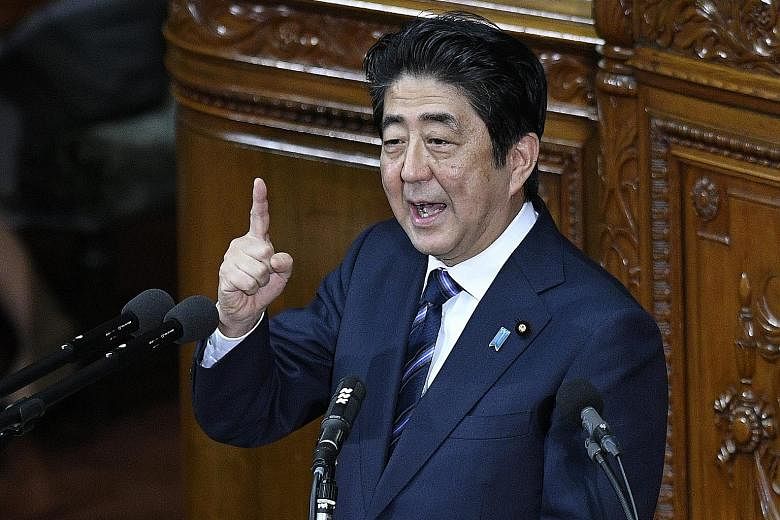TOKYO • Prime Minister Shinzo Abe has so far warded off the curse that has afflicted many a Japanese premier - a collapse in public support - despite presiding over a lacklustre economy.
He could yet become Japan's longest-serving leader since World War II - if party rules are tweaked to allow him to extend his tenure.
The Liberal Democratic Party (LDP) has begun debate on changing a rule that limits party leaders to two straight three-year terms. It aims to make a decision in time for the party convention next year, enabling Mr Abe to potentially stand for re-election when his six years are up in 2018.
That could see him stay on beyond the 2020 Tokyo Olympics. The move came after Mr Abe appointed Mr Toshihiro Nikai, a vocal proponent of the extension, as his second-in-command in the party.
If Mr Abe were to step down after the Olympics he would have served almost nine years as prime minister - longer than anyone under the post-war political system. The LDP itself has been in power for most of the past 60 years.
That is even as Mr Abe has failed to meet many of his own economic policy goals under the Abenomics banner - deflation remains hard to budge, a stronger yen is starting to hurt exporters, and his efforts to get more women into the workforce have struggled amid a shortage of childcare and elderly care.
The economy has shrunk in five of the 14 quarters since he took office in 2012. "Whatever we think of Abenomics, we have to remember that the Japanese workforce is basically on a full-employment basis right now," said Mr Jun Okumura, a visiting scholar at the Meiji Institute for Global Affairs.
"Although the inflation target worries people who care about what the Bank of Japan does, in the meantime inflation is not hurting people with fixed incomes and new graduates are finding it much easier to find jobs," Mr Okumura said.
Employment for new graduates rose to 74.7 per cent this year - the sixth consecutive rise - and overall unemployment fell to 3 per cent in July, its lowest since 1995.
Several surveys this month have put voter approval at the highest level in two years, contrasting with the nosediving popularity experienced by the previous six administrations, including Mr Abe's own first government from 2006 to 2007.
Under his leadership, the ruling coalition has won four straight national elections.
Despite losing several ministers to scandal, Mr Abe has generally kept control of his party. His policies of increasing the defence budget and loosening restrictions on the armed forces, while divisive, could help him on the domestic front amid friction with China and an increasingly belligerent North Korea.
Mr Abe has vowed to focus on reforming working practices in Japan during the new parliamentary session, seeking to narrow the gulf in pay between regular and non-regular workers as well as allow more people to combine their roles as carers with paid work.
"The key words of my economic policy will be investing in the future," he told Parliament yesterday.
"We will support families with children and expand care for the elderly", so that no one with carer responsibilities is forced to give up their job, he said.
BLOOMBERG

